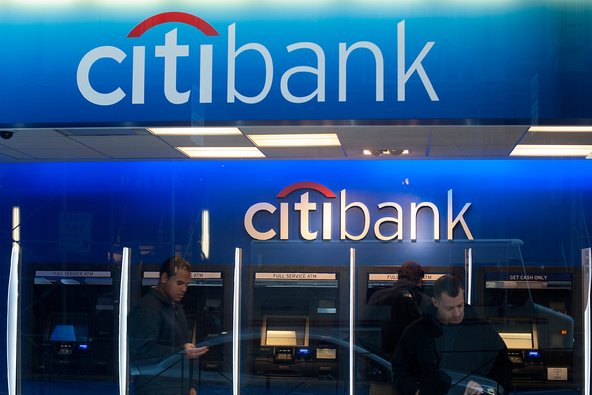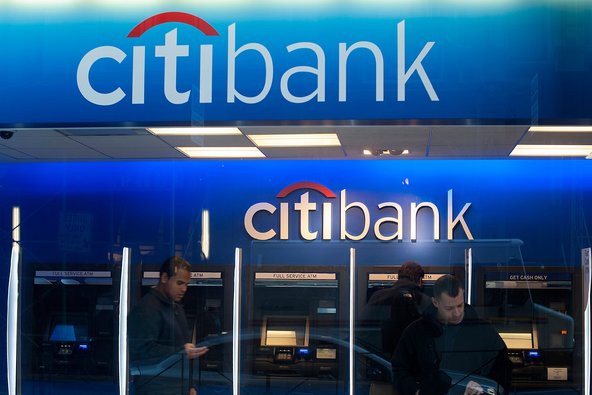 Keith Bedford/ReutersA Citibank branch in New York.
Keith Bedford/ReutersA Citibank branch in New York.
2:20 p.m. | Updated
Citigroup on Monday reported first-quarter profit of $3.8 billion, or $1.23 a share, exceeding analysts’ estimates, as the bank continued to reduce costs and unload troubled assets.
The bank also reported higher revenue of $20.5 billion, buoyed by continued gains in its investment banking business.
Related Links
In the lead up to the release of bank’s quarterly earnings, analysts had estimated the bank would post earnings of $1.18 a share on revenue of $20.17 billion, according to a survey by Thomson Reuters. Adjusted for certain charges, the company reported a profit of $4 billion on revenue of $20.8 billion in the first quarter. Citigroup’s stock rose more than 1 percent, to $45.32 by mid-afternoon, on a day when there was a widespread sell-off of stocks.
“Achieving consistent, high-quality earnings is one of my top priorities and these results are encouraging,” Michael L. Corbat, the bank’s chief executive, said in a statement. “During the quarter, we benefited from seasonally strong results in our markets businesses, sustained momentum in investment banking, continued year-over-year growth in loans and deposits in Citicorp, and a more favorable credit environment.”
The results come after a particularly disappointing fourth quarter for Citigroup, when profits were hampered by mortgage woes stemming from the financial crisis. Last quarter, for example, Citigroup had $1.3 billion in legal costs and related expenses.
Citigroup has been aggressively whittling down a morass of soured loans and cutting less-profitable business lines in an effort to reduce costs. In December, it said it would eliminate 11,000 jobs worldwide. Within its Citi Holdings unit, Citigroup continues to unwind a glut of soured assets. The assets in that unit were down by $60 billion in the first quarter.
Like its rivals JPMorgan Chase and Wells Fargo, Citigroup said revenue growth slackened in the first quarter. Citigroup faces increasing pressure to cut costs and bolster shareholder returns.
Mr. Corbat addressed the continued difficulty in the banking industry as the economy limped toward a recovery, saying in a statement that “the environment remains challenging and we are sure to be tested as we go through the year.”
The earnings on Monday pointed to a broad skittishness among consumers to take on fresh debt.
“I don’t think we have a real confident consumer driving the economy,” John C. Gerspach, the bank’s chief financial officer, said on a call on Monday. “I still think we are seeing a certain amount of deleveraging.”
Citigroup has been trying to capitalize on its vast international footprint and to focus on developing countries that offer more opportunities for growth than the United States. In North America, revenue fell to $5.1 billion from $5.2 billion in the period a year earlier. The decline stems in part from a persistent caution among Americans to take on additional loans.
Despite sluggishness in North America, Citigroup reported revenue growth of 4 percent in Latin America. Net income within Latin America rose 5 percent, to $412 million, in the first quarter, while net income in the global consumer banking group fell 11 percent, to $1.95 billion.
Citigroup is also grappling with a continually shifting regulatory landscape in Asia. In South Korea, for example, national officials placed a cap on the interest rates of a range of consumer loans. Mr. Gerspach noted that there were “still headwinds” in the region.
Beneath the headline numbers, Citigroup experienced gains in some of its businesses, and deposits grew 3 percent, to $934 billion. Total loans also rose 5 percent, to $539 billion.
Still, Citigroup, like other banks, struck an optimistic tone about consumers’ ability to pay their bills on time. Delinquencies have fallen, Mr. Gerspach said. “All the improvements we have been seeing not only carried over into the first quarter, but improved,” he said.
Another bright spot in the first quarter was the securities and banking group, which was bolstered by strong gains in investment banking, fixed income and equities. Revenue surged 31 percent, to $6.98 billion, while net income was $2.3 billion, up 81 percent from the period a year earlier. For Citigroup, the unit has been a consistent focus. Mr. Gerspach reiterated that on Monday, saying the bank continued to make “steady progress” in its share of a “client’s wallet.”
Much of the gains in securities and banking came from Citigroup’s investment banking unit, which was buoyed by increases in debt and equity underwriting. The unit’s revenue increased to $1.1 billion, up 22 percent from the period a year earlier.
The quarterly report is the second under the leadership of Mr. Corbat, who took over after the abrupt ouster of Vikram S. Pandit. In October, Michael E. O’Neill, the bank’s forceful chairman, pushed Mr. Pandit out in favor of Mr. Corbat.
Since taking over, Mr. Corbat has vowed to continue reorienting the bank toward its core business while shedding less-profitable units. Mr. Corbat has said he is willing to eliminate operations across the globe.
Citigroup continues to be haunted by its mortgage woes. Last month, it agreed to pay $730 million settle claims that it duped investors into buying securities backed by shaky mortgage loans. The bank did not admit any wrongdoing. Cautioning investors on Monday, Mr. Gerspach said that legal expenses remained “volatile.”
This post has been revised to reflect the following correction:
Correction: April 15, 2013
An earlier version of this article misstated Citigroup’s revenue performance in North America. Revenue fell to $5.1 billion from the period a year earlier, it didn’t increase.
Article source: http://dealbook.nytimes.com/2013/04/15/citigroups-earnings-rose-30-in-first-quarter/?partner=rss&emc=rss
